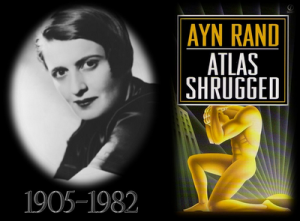I read Atlas Shrugged, by Ayn Rand, several years ago. Granted I did occasionally skim through the dialog, some of which is not dialog but long speeches. (Presenters at writers’ conferences warn novelists to avoid this type of dialog like a mortal sin.)
The main characters are Dagny Taggart, a railroad magnate, and the mysterious John Galt, who, as it turns out, has established a hidden capitalist nirvana, for such people as Taggart. As the world collapses from the weight of the undeserving masses living off the work of the brave capitalists, true capitalism lives on in this heavenly retreat.
As I read Rand’s book, I wondered what happened to people who were handicapped or became ill. Unfortunate accidents do happen to people, rendering them unable to work. Do we leave such people by the side of the road to die? Kill them, resembling Nazis executioners?
Following World War II, capitalism defeated Soviet-style communism, which Rand knew as a child and rebelled against. Capitalism is an efficient way to run an economy, as long as capitalists are understood as humans like the rest of us. Any of us can become dangerous if we have unfettered power—whether we are socialists or capitalists.
Would some capitalists, being human, if given absolute power, not be tempted to worship wealth? To accumulate wealth with little regard for worker safety or clean air and water or the ability of their workers to afford decent housing or send their children to college with the wages paid them?
Read Adam Lee Alternet’s critique of this book in Salon (“10 (insane) things I learned about Atlas Shrugged,” April 29, 2014) for some interesting observations.
Then read other views of Rand’s philosophy in The New York Times.


 Ayn Rand was born in Russia and witnessed the horror of the communist takeover there. America became her ideal, and she immigrated to the United States as a young woman. She believed in unfettered capitalism, a complete separation of economics and state.
Ayn Rand was born in Russia and witnessed the horror of the communist takeover there. America became her ideal, and she immigrated to the United States as a young woman. She believed in unfettered capitalism, a complete separation of economics and state.